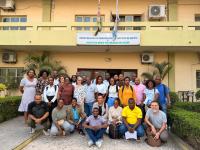Latin America and the Caribbean approaching half-way mark toward goal of 100% voluntary blood donation

This year's World Blood Donor Day, June 14, features the slogan "Share life, give blood" and focuses on how "blood connects us all." The 2016 campaign thanks all blood donors and highlights the solidarity and connection between donors and patients.
Blood and blood components are essential to help people survive a number of severe health conditions, medical procedures, complex surgeries, childbirth, and injuries from accidents and disasters. Every voluntary altruistic blood donation can save as many as three lives.
Research shows that an adequate and reliable supply of safe blood can only be assured by regular, voluntary, unpaid blood donors. In Latin America and the Caribbean, just over 45% of the approximately 9.2 million blood units collected for transfusions in 2014 came from voluntary donors, while the remaining 55% came from replacement donors, typically relatives or friends who donate blood on an emergency basis to replace used by a patient.
The percentage of voluntary donation in countries in the Americas has increased only modestly, by 4 percentage points between 2010 and 2014 (from 41% to 45%). The Pan American Health Organization (PAHO) is urging people to use this year's campaign as the perfect opportunity to become regular voluntary blood donors.
"The Member States of the Americas have made great progress toward ensuring safe and sufficient blood supplies. But we continue to face a number of challenges," said PAHO Director Carissa F. Etienne, noting that in many countries the demand for blood exceeds the available supply. "It is only by collecting sufficient blood from voluntary unpaid donors that we can ensure its availability, quality, and safety."
PAHO estimates that at least 2% of the population must donate blood on a regular basis if a country is to meet its needs for blood and other blood components. In Latin America and the Caribbean, blood collection rates average about 1.5%.
Currently, nine countries and territories of Latin America and the Caribbean, together with the United States and Canada, obtain their national blood supplies entirely from unpaid voluntary donors. An additional seven countries of the Americas have made major progress, with over 50% voluntary donations. However, other countries in the region continue to rely on replacement donors.
To help motivate regular donors to continue donating blood and to encourage healthy people who have never donated to do so, especially young people, the World Health Assembly in 2004 designated June 14 as World Blood Donor Day. This year's campaign draws attention to the important role that voluntary-donation systems play in encouraging people to care for one another and to promote community cohesion.
"Community participation is essential to achieving universal access to a safe, sufficient, and sustainable blood supply that ensures that blood and blood components are available when and where they are needed," said María Dolores Pérez-Rosales, PAHO/WHO regional advisor on blood services and organ transplants. "We need both the commitment of health authorities and the solidarity of entire communities, because donating blood several times a year is a simple act that saves lives."
PAHO, which serves as Regional Office for the Americas of the World Health Organization (WHO), is working with its member countries toward an ambitious but achievable goal: that 100% of blood needed for transfusions be obtained from voluntary donors by 2019. PAHO's technical cooperation promotes voluntary donation through support for training of health professionals, community education, and blood supply planning, among other activities.
PAHO also collaborates in implementing quality management programs for the blood transfusion chain. These programs seek to ensure that all blood units are screened for transfusion-transmissible infections (e.g., HIV, hepatitis B and C, syphilis, and Trypanosoma cruzi) while also promoting the rational use of blood and blood components, strengthening of health surveillance, haemovigilance, risk management, monitoring, and evaluation.
Ecuador, host country for World Blood Donor Day in the Americas
In recognition of its efforts to improve blood safety and increase the number of altruistic donors, Ecuador was selected by PAHO to host World Blood Donor Day 2016 in the Americas. Ecuador increased voluntary blood donation from 38% in 2010 to 60% in 2014.
The commemorative event will be held in Portoviejo, one of the cities most severely affected by the 7.8-magnitude earthquake that struck Ecuador last March. Portoviejo was selected by the Ecuadorian authorities to demonstrate the importance of having a well-organized national blood service to ensure an adequate blood supply when natural disasters strike. Special activities for the day will include a "social circus" to raise public awareness through social interaction and messages that promote a culture of voluntary blood donation.
Blood donation in Latin America and the Caribbean (data for 2014)
- 9,252,583 blood units collected
- 45.39% voluntary donations
- 54.52% donations from replacement donors
- 0.09% remunerated donations
- 14.84 blood donations per 1000 population in Latin America and the Caribbean (11.7 is the average for middle-income countries)
- 11 countries and territories of the Americas obtain 100% from voluntary blood donors: Cuba and Nicaragua in Latin America; Aruba, Bermuda, Cayman Islands, Curaçao, French Overseas Departments, Montserrat, and Suriname in the Caribbean; and Canada and the United States in North America.
- 7 other countries and territories collect over 50% from voluntary blood donors: Brazil, Colombia, Costa Rica, and Ecuador in Latin America; and Guyana, Haiti, and Saint Lucia in the Caribbean.



